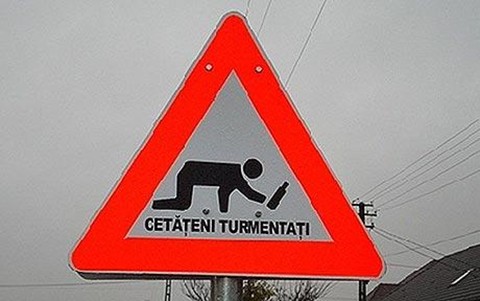
The sign above, which features script that translates as “Attention: Drunks,” was briefly part of a safety initiative in the Romanian town of Pecica. The mayor was concerned that too many of inebriated pedestrians were getting mowed down by cars, and so sought to duplicate a series of warning signs that he had once encountered in Germany. All was going well until the international media caught wind of the story, and made the program out to be ridiculous. The poor mayor was forced to relent.
That’s a pity, because despite the humor of the signs’ graphic, the issue is a serious one—particularly in Central and Eastern Europe, where alcohol consumption is high and traffic safety a low priority. According to this 2009 study, for example, 36 percent of pedestrian deaths in Slovenia involve people with blood-alcohol levels in excess of 0.20. (The figure in the U.S. is closer to 25 percent.)
Banning drunken walking is obviously not feasible, so what is to be done? This fact sheet notes that most deaths occur not when drinkers are returning home from bars, but rather when folks partying at home decide to make a midnight trek to the store for beer or cigarettes. We must therefore decide what is more important to our society: the 24-hour availability of intoxicants, or several hundred (or even thousand) human lives per year.
We don’t mean to be flippant about that choice. We are obviously not in favor of anyone getting hurt—every death is a tragedy. But it is inevitable that some of our societal choices will lead to harm for those who choose to act irresponsibly. Coming to terms with that fact would greatly help our body politic make wiser decisions; in the absence of that revelation, emotion too often sways us toward the greater of two evils.
(h/t Erik Ness)


Jordan // Mar 16, 2010 at 1:35 pm
I’ve definitely heard debates among my friends about what level of availability of alcohol makes the most sense. Until recently, Oregon liquor stores were never open on Sundays and few were open past 7 on the other days of the week. That’s shifted, but you’re still out of luck past 8 PM. Some have joked that this encourages binge drinking because you have to stock up all at once rather than being able to get whatever you happen to need at a given point. But your point might indicate that this might also prevent traffic deaths because people will have to get everything they’re going to drink beforehand.
America would presumably present a fairly good data set since the states have such a variety of liquor laws. On the one hand you have CA where 24 hour grocery stores sell hard liquor. On the other hand, there are still plenty of states with Blue Laws. And then there’s Utah were it’s close to impossible to get a drink period. If there’s a correlation between increased availability at a given hour of the night and higher traffic deaths then you could at least have a better sense of cause and effect.
Brendan I. Koerner // Mar 16, 2010 at 3:13 pm
@Jordan: That would definitely be a worthwhile research project. There would have to be some way to compensate for the geographical uniqueness of each state–those with denser populations will have more drunken pedestrians, since they will also have more stores within walking distance. But that can certainly be done.
I’m generally opposed to blue laws, esp. of the more severe variety. I went to college in Connecticut, and they had the no-beer-on-Sunday rule at the time (perhaps since abandoned). There was something quite sad about walking down a supermarket aisle and seeing a canvas tarp padlocked over all the rows of six packs.
On the other hand, to paraphrase Chris Rock, when’s the last time anything good came out of buying a case of beer at 4 a.m.?
Brian Moore // Mar 17, 2010 at 3:48 pm
Did you read the section in the new SuperFreakonomics about the riskiness (to oneself) of drunk walking vs. drunk driving? Nothing particularly amazing to add, just that it popped into my head when reading this.
Brendan I. Koerner // Mar 17, 2010 at 4:38 pm
@Brian Moore: Haven’t read that book. It’s on the list, hopefully for the summer (assuming I get to take a few days off).